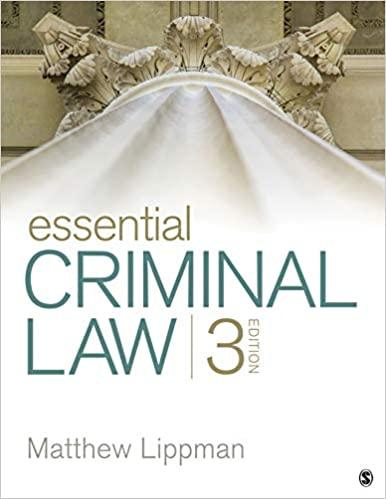Question
summarize this lecture please. Law consists of the body of principles that govern conduct and that can be enforced in courts or by administrative agencies.
summarize this lecture please.
Law consists of the body of principles that govern conduct and that can be enforced in courts or by administrative agencies. The law could also be described as a multitude of rights.
Nature of Law and Legal Rights
Legal Rights
A right is a legal capacity to require another person to perform or refrain from performing an act. Our rights flow from the U.S. Constitution, state constitutions, federal and state statutes, and ordinances at the local levels, including cities, counties, and boroughs. Within these same sources of rights are duties. A duty is an obligation of law imposed on a person to perform or refrain from performing a certain act.
Duties and rights coexist. No right can rest on one person without a corresponding duty resting on some other person or persons. For example, if the terms of a lease provide that the premises will remain in a condition of good repair so that the tenant can live there comfortably, it is the duty of the landlord to provide a dwelling that has hot and cold running water.
Based on the documents that created the government for the United States, individuals were given certain rights. Those rights include the right to freedom of speech, the right to due process or the right to have a hearing before any freedom is taken away, and the right to vote. There are also duties that accompany individual rights, such as the duty to speak in a way that does not cause harm to others. For example, individuals are free to express their opinions about the government or its officials, but they would not be permitted to yell "Fire!" in a crowded theatre and cause unnecessary harm to others. The rights given in the U.S. Constitution are rights that cannot be taken away or violated by any statutes, ordinances, or court decisions. These rights provide a framework for the structure of government and other laws.
The Right of Privacy
One very important individual legal right is the right of privacy. There are two aspects to the right of privacy. The first is the right to be secure against unreasonable searches and seizures by the government. This aspect of the right of privacy is guaranteed by the Fourth Amendment of the U.S. Constitution. A police officer, for example, may not search your home unless the officer has a reasonable suspicion (which is generally established through a warrant) that your home contains evidence of crime, such as illegal drugs. If your home or business is searched unlawfully, any items obtained during that unlawful search will not be admitted as evidence in a criminal trial because of the Fourth Amendment's exclusionary rule. For example, in the murder trial of O.J. Simpson, Judge Lance Ito excluded some of the evidence the police had obtained from inside Mr. Simpson's Ford Bronco, which was parked on the street outside his home. Judge Ito ruled that the officers should have first obtained a warrant for the locked vehicle, which was not going to be taken anywhere because Mr. Simpson was out of town at that time.
A second aspect of the right of privacy protects individuals against intrusions by others. Your private life is not subject to public scrutiny when you are a private citizen. This right is articulated in many state constitutions and was found through interpretation at the federal level in the landmark case ofRoe v Wade, in which the U.S. Supreme Court established a right of privacy that gives women the right to choose weather or not have an abortion.
There are many interpretations of these two aspects of the right to privacy. These interpretations are often found in statutes that afford privacy rights with respect to certain types of conduct. For example, a federal statute provides a right of privacy to bank customers that prevents their banks from giving out information about their accounts except to law enforcement agencies conducting investigations. There are laws that protect the rights of students. For example, the Family Educational Rights and Privacy Act of 1974 (FERPA, also known as the Buckley Amendment) prevents colleges and universities from disclosing students' grades to third parties without the students' permission.
Step by Step Solution
There are 3 Steps involved in it
Step: 1

Get Instant Access to Expert-Tailored Solutions
See step-by-step solutions with expert insights and AI powered tools for academic success
Step: 2

Step: 3

Ace Your Homework with AI
Get the answers you need in no time with our AI-driven, step-by-step assistance
Get Started


